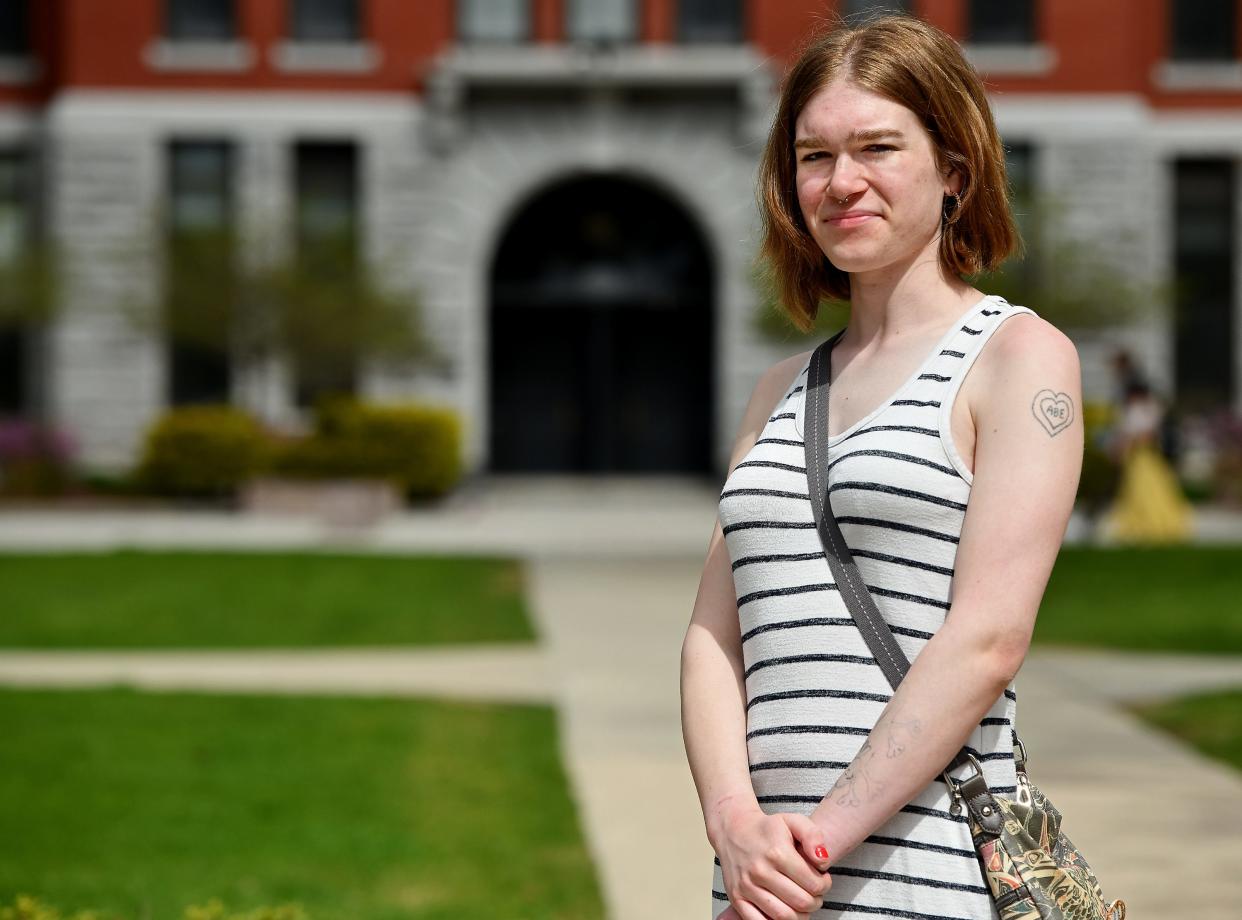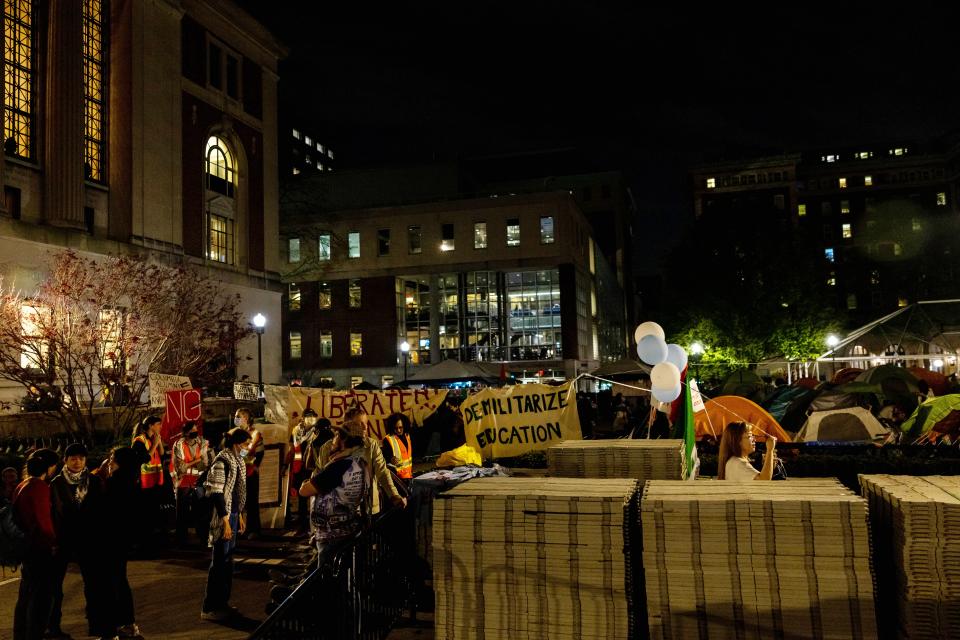Israel-Hamas conflict: What is the level of concern on college campuses in Worcester?

WORCESTER ― Although it is the second-largest city in New England, with numerous colleges and universities, Worcester hasn't experienced the level of civil unrest tied to the war in Gaza that has occurred on college campuses in Boston, New York and elsewhere.
Encampments on a large scale, and scenes of police moving to break down the camps, have been absent here thus far.
However, don’t confuse the current local landscape with passivity. While other campuses are in the news, Worcester's college students are experiencing anxiety and fear tied to the Israel-Hamas conflict. There are concerns here about student safety and about words and online messaging that some feel are rooted in antisemitism and Islamophobia.
Meanwhile, students at one local university are demanding that administration divest any of its financial holdings connected to Israel.
'Fairly contentious'
At Clark University, “It’s definitely been fairly contentious,” said senior Eve Harmon, who grew up in Boston. Harmon is vice president of an on-campus club called J Street U. The group's online description says it advocates against Israel’s occupation of the West Bank and Gaza and for peaceful policies in the region.
Peace may be the goal, but Harmon conceded that when it comes to the war in Gaza, “there have been a lot of disagreements among (Clark) students.”
The most recent case is an inflammatory attack posted on Fizz, an anonymous social media application. The message called for sexual and physical violence against the daughters of Zionists.
The post read, in part: “I hope they experience as much pain as the people in Gaza have for 75+ years. Zionists are subhuman vermin.”
Clark administration noted in its response to submitted questions by the Telegram & Gazette that Fizz isn’t technically affiliated with the university. However, campus police are investigating the post. “Though there are limitations to what we are able to do, we intend to work tirelessly to pursue action,” said Clark's email.
“Disgusting” is how Ethan Quinn, president of Clark University Hillel, described the Fizz post. Quinn hopes the university finds who's behind the message and holds them accountable.
Conflict at Worcester State
Clark isn’t alone when it comes to campus tension over the Israel-Hamas conflict and its many complicated layers.
Worcester State University has also experienced student rancor. "Mostly verbal, with students shouting, accusing each other of antisemitism and Islamophobia," said senior Nolan Lonstein, vice president of the university’s student government board.
“We’re a diverse campus and there has been conflict between student and student, student and administration, student and faculty,” said Lonstein. "For a lot of students, this is personal.”

A request for comment from Worcester State administration to provide an assessment of current campus affairs was not immediately returned.
Emotions reached a boiling point in March when a member of the Israeli Defense Forces visited Worcester State to share his experiences in the conflict. Video published on social media showed what sounded like a fire alarm being pulled while some in the crowd shouted that members of the Israeli Defense Forces were terrorists. Pro-Palestinian activists claimed the invited guest, Cmdr. Shahar Peled, supported genocide.
Peled's visit was organized by Mary Jane Rein, executive director of the Strassler Center for Holocaust and Genocide Studies at Clark University, along with a history professor at Worcester State and the Jewish Federation of Central Massachusetts. Rein subsequently wrote in a Wall Street Journal editorial that she had resigned from the Strassler Center after three Clark doctorate students from the center told her to step down and threatened to have her investigated for organizing the event.
Rein is now at Assumption University, where she is director of the new Center for Civic Friendship.
Clark students demand divestiture
Earlier this month, a sizable block of Clark undergraduates called on the administration to divest its financial holdings from companies doing business with Israel.
Roughly 700 of Clark's 2,300 undergraduates voted on four nonbinding referendum questions, each calling for a different aspect of divestiture. One pertained to the university's endowment. Others ranged from cutting off funds tied to on-campus clubs and a boycott of university purchases from Amazon, the massive online retailer that reportedly has financial ties to Israel.
Voting results on the questions ranged from 76% to 87% of students supportive of divestiture, according to information supplied by Harmon.
Clark’s student council organized the referendum, according to Clark, a development confirmed by Harmon and Quinn. Another on-campus student group, the Food Insecurity Resistance Movement, also led the referendum, according to Quinn.
Clark didn't immediately respond to a request to provide a dollar figure of its endowment and how much of it is invested in companies connected to Israel.
'Environment of intimidation'
Quinn fears the vote created an “environment of intimidation” that “put a target on students backs.” He feels it ramped up hostility toward Jewish and Israeli students and those that support them.
“I hope the university’s administration does not adopt any part of this referendum. We hope and pray that nothing comes of it,” said Quinn.
That could happen, because the university said the referendum is nonbinding and doesn't require action. However, Clark's email response to T&G inquiries said it will continue to engage with students around issues related to the situation in the Middle East, including divestment.
Antisemitism: Tool to weaponize the debate?
Harmon, who is Jewish, believes some Jewish students at Clark are using claims of antisemitism to weaponize the debate and shut down attempts to have an open dialogue about the Mideast conflict.
One can be Jewish, said Harmon, and not support Israel’s position in the conflict.
To support the point about the weaponization of antisemitism, Harmon cited a November letter from Clark’s top administrative leaders, including President David Fithian. The correspondence, titled Standing Against Antisemitism and Islamophobia, stated “from the river to the sea” is being used by some on campus to instill fear among those of the Jewish faith.
It's a phrase that's open to interpretation, as some say it's a call for peace. “From the river to the sea" is not the whole phrase often chanted at Pro-Palestinian rallies. The collective chant also includes "Palestine will be free." Others believe the chant calls for Israel's destruction, as the country is located between the Jordan River and the Mediterranean Sea.
As Harmon sees it, Clark Hillel has “institutional power” that is closely aligned with the university’s administration.
“They have used their voice for months to push back on what student organizations are saying and doing,” said Harmon. “We don’t want antisemitism to be weaponized to shut down conversation and it’s often been used in that manner.”
Quinn strongly disagrees with Harmon’s take.
“The connection to Israel is real and it’s very much an identity piece for many Jewish students at Clark,” said Quinn. “To dismiss claims that students don’t have an identity to Israel is antisemitic.”
Why not in Worcester?
As for why there hasn’t been civil unrest on a scale seen on some college campuses in other parts of the United States, Harmon believes Clark’s small size is a factor, as well as concern that administration will crack down on those who don't adhere to the university's code of conduct.
Clark's email response to T&G inquiries said that free speech is encouraged, but harassment, intimidation, discrimination or suggestions of violence against others is prohibited. When asked if any students, faculty and administrators have been punished in connection with protests and statements made about the Mideast conflict, Clark said disciplinary action is a private matter.
"When activity is found to be in violation of our code of conduct, we have specific processes and procedures to hold members of the community accountable," said Clark. "The result of any specific disciplinary action is not made public."
Quinn commended Clark’s administration for staying on top of the conflict. Colleges that took their eyes off the ball are the ones facing the fallout, he said.
No. 1 priority: Student safety
Worcester State’s Lonstein, who grew up in Boylston, has no doubt that the university's No. 1 priority is student safety amid the debate on campus over the Israel-Hamas conflict. Lonstein has an inside take because as a member of student government, he said he has regular meetings with the university's provost.
While Lonstein said keeping an open dialogue is critical to addressing student concerns about the Mideast conflict, he also acknowledged that he's "a bit surprised” that Worcester State students aren’t engaged in more active protesting.
But that could change, and quickly.
“I expect something to happen relatively soon" on campus or in Worcester, said Lonstein. "I would be surprised if it didn’t.”
Contact Henry Schwan at henry.schwan@telegram.com. Follow him on X: @henrytelegram.
This article originally appeared on Telegram & Gazette: Israel-Hamas war reactions on Worcester college campuses

